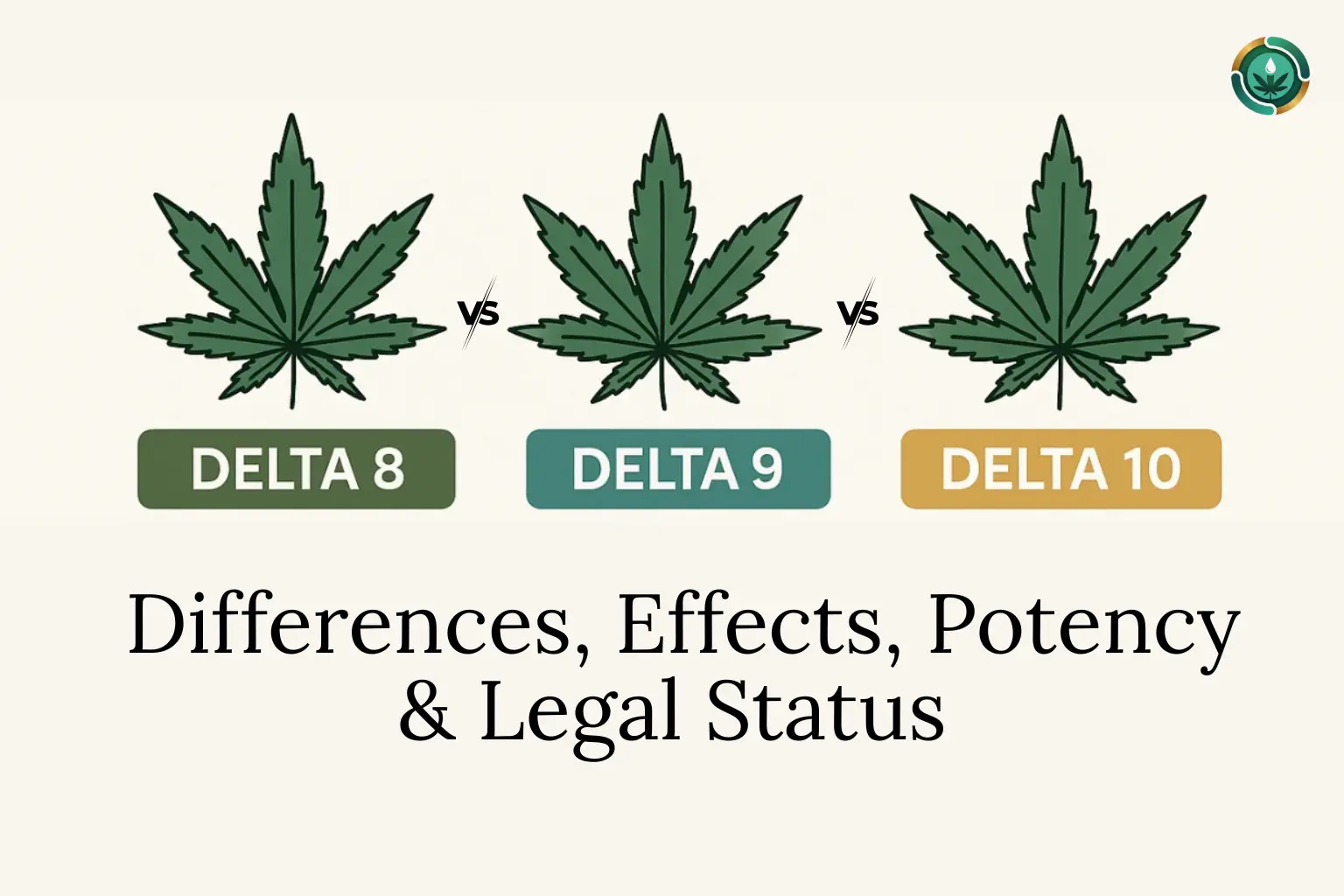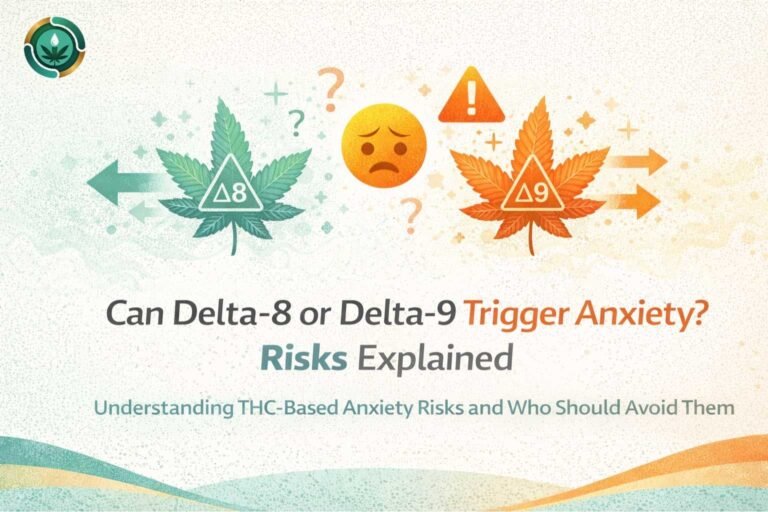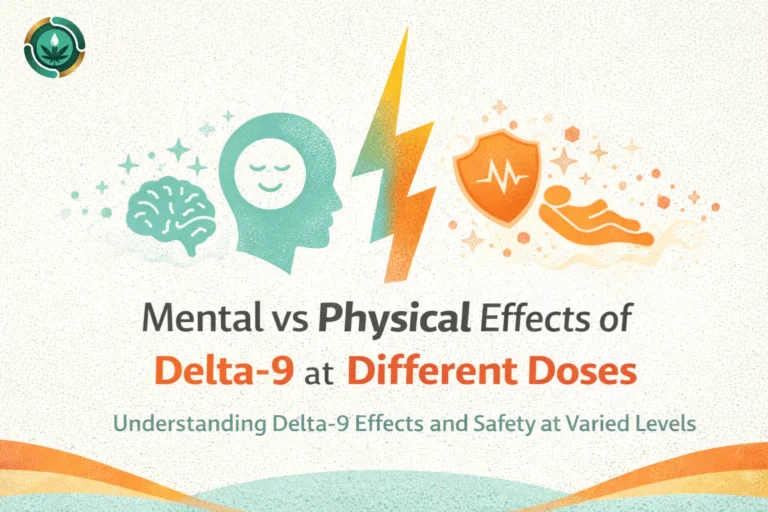
Introduction
The cannabis and hemp market continues to evolve at lightning speed. With new cannabinoids gaining popularity, names like Delta-8 THC, Delta-9 THC, Delta-10 THC, and even the newer Delta-11 THC often leave people wondering what truly sets them apart.
Are their effects the same? Which one is stronger? And most importantly, which are legal in 2025?
In this article, we’ll explain everything you need to know about these THC isomers — from how they work and how they feel to where they stand legally in the U.S. this year.
Understanding the Basics: What Are THC Isomers?
All four — Delta-8, Delta-9, Delta-10, and Delta-11 — are isomers of THC (tetrahydrocannabinol). That means they share the same chemical formula but have their atoms arranged slightly differently. This small structural difference changes how each compound interacts with your body’s endocannabinoid system, influencing how strong their effects feel.
- Delta-9 THC is the classic, naturally occurring compound that’s long been known as the main psychoactive element in cannabis.
- Delta-8 THC has a slightly altered molecular bond that makes it less intense and more relaxing.
- Delta-10 THC is considered a more energizing, lighter version of THC.
- Delta-11 THC is a newer, emerging form that many compare to a blend between Delta-8 and Delta-9 in strength and sensation.
Each form interacts differently with CB1 receptors in the brain, giving rise to their unique effects and potency levels.
Effects and Potency: How Each Feels
Delta-9 THC
Delta-9 is the most potent and well-studied of the group. It’s responsible for the traditional cannabis “high” — feelings of euphoria, deep relaxation, altered sensory perception, and sometimes, couch-lock. Because it binds strongly to the CB1 receptor, even small doses can produce strong psychoactive effects.
However, Delta-9 can also cause anxiety, paranoia, or rapid heartbeat in some people, especially at higher doses.
Delta-8 THC
Delta-8 offers a milder, calmer version of the Delta-9 experience. It delivers similar euphoric and relaxing sensations but with a smoother onset and less mental fog. Many users describe it as a “functional high” — you can feel the effects but still remain alert and productive.
It’s popular among those who find regular THC too overwhelming but still want mild psychoactive effects or relief from stress and pain.
Delta-10 THC
Delta-10 is the lightest and most uplifting of the three. Users often report a clean, clear-headed buzz with mild euphoria and focus enhancement. It tends to feel more energizing than sedating, which is why it’s sometimes compared to a “sativa-like” experience.
It’s often used during the day for creativity or mood enhancement without heavy drowsiness.
Delta-11 THC
Delta-11 is relatively new and less researched but quickly growing in popularity. Early reports suggest it’s somewhere between Delta-8 and Delta-9 in potency, offering both relaxation and euphoria. Some even claim it lasts longer than other forms, though data is still limited.
Because Delta-11 shares a similar structure to other THC isomers, its psychoactive profile isn’t drastically different — but subtle differences make it unique enough to draw attention from consumers seeking something new.
How Potency Compares
In general terms, potency can be ranked as:
Delta-9 THC → Strongest
Delta-8 THC → Moderate
Delta-10 THC → Mildest
Delta-11 THC → Moderate to Strong (varies by formulation)
Individual tolerance, body chemistry, and method of consumption (vape, edible, tincture, etc.) also play a big role in how strong each one feels.
Drug Tests & Detection
Even though these cannabinoids differ chemically, most drug tests don’t distinguish between THC isomers. They detect THC metabolites — the byproducts formed when your body processes any form of THC.
That means whether you use Delta-8, Delta-9, Delta-10, or Delta-11, you can still test positive for THC. So anyone facing workplace or legal drug testing should use these products cautiously.
Federal Law: The 2018 Farm Bill
The foundation of all hemp and cannabinoid legality in the U.S. comes from the 2018 Farm Bill. It federally legalized hemp and all its derivatives, as long as the product contains no more than 0.3% Delta-9 THC on a dry-weight basis.
Because the law specifically limits only Delta-9 THC, manufacturers found a loophole allowing them to produce other THC isomers like Delta-8, Delta-10, and Delta-11 from hemp-derived CBD.
This opened up a massive new market of “hemp-derived THC” products — even though they can still produce psychoactive effects.
However, the Farm Bill doesn’t explicitly address synthetically converted cannabinoids, leaving room for ongoing legal debate.
State-by-State Legality in 2025
While hemp-derived cannabinoids remain federally legal (as long as Delta-9 is under 0.3%), individual states can make their own rules.
Many states now regulate or ban Delta-8 THC, Delta-10 THC, and similar compounds due to concerns about unregulated manufacturing and safety. Others have kept them legal under hemp laws.
A simplified overview:
- Some states allow hemp-derived Delta-8 and Delta-10 if they meet federal THC limits.
- Some states ban all psychoactive cannabinoids, regardless of source.
- Others regulate them like cannabis, requiring testing, labeling, or sales through licensed dispensaries.
Delta-11 THC falls into a gray area since most state laws don’t mention it by name yet. However, in states that ban “all THC isomers,” Delta-11 would likely be included automatically.
Because these laws are changing quickly, it’s crucial to check local regulations before purchasing or traveling with any THC isomer product.
Federal vs. State Conflict
This clash between federal hemp law and state cannabis restrictions creates constant confusion. Some products that are legal federally can still be considered illegal under state law, and vice versa.
The federal government is currently reviewing potential Farm Bill updates that could redefine “hemp” and close the loophole allowing intoxicating cannabinoids. If passed, it could significantly change how Delta-8, Delta-10, and Delta-11 are sold across the country.
Meanwhile, enforcement remains inconsistent — some states are cracking down hard, while others allow open retail sales.
What About Delta-11’s Legal Standing?
Delta-11 THC is the newest player, and because it’s chemically related to other THC isomers, it’s expected to be treated similarly in upcoming regulations.
If it’s naturally derived from hemp, it might be protected under current federal hemp law. But if it’s chemically converted from CBD (as most are), it could eventually fall under “synthetic cannabinoid” restrictions.
In states with blanket bans on THC isomers or “chemically modified cannabinoids,” Delta-11 would likely be illegal.
Because it’s so new, legal clarity is limited — but it’s wise to assume it may face the same scrutiny as Delta-8 and Delta-10 in the near future.
Consumer Awareness: Staying Safe and Legal
With so many cannabinoids now available online and in stores, it’s important to stay informed and cautious. Here’s what consumers should do:
- Always check the COA (Certificate of Analysis).
Look for third-party lab reports that verify potency, purity, and Delta-9 THC levels. - Understand your state’s laws.
Rules can differ drastically between states, even neighboring ones. - Avoid unclear or synthetic-sounding products.
Anything labeled as “synthetic THC” or “lab-made cannabinoid” could carry more legal risks. - Expect to fail a drug test.
Even legal cannabinoids may trigger positive THC results. - Buy from reputable brands.
Trusted companies clearly label ingredients, provide COAs, and comply with safety standards.
Because Delta-11 THC is still emerging, it’s especially important to buy only from brands that disclose extraction methods and test results transparently.
Future Outlook: Where the THC Market Is Headed
As of 2025, the hemp and cannabinoid industry is in a transitional phase. Several trends are expected to shape the next few years:
- Stricter definitions of hemp and THC isomers in the updated Farm Bill.
- State-level bans or licensing systems for intoxicating hemp products.
- Increased testing and labeling requirements to ensure product safety.
- Legal clarity around synthetic or converted cannabinoids, including Delta-11.
- Ongoing innovation in minor cannabinoids like THCP, THCA, and HHC as companies look for compliant alternatives.
Consumers can expect more regulation and transparency — but also, likely, fewer “gray area” hemp THC products on the open market.
Quick Comparison Table
Final Thoughts
Each THC isomer offers its own balance of potency, duration, and mood effects.
- Delta-9 THC delivers the classic, powerful high.
- Delta-8 THC provides a gentler, more manageable version.
- Delta-10 THC offers a lighter, energizing buzz.
- Delta-11 THC represents the newest frontier — promising, but still under legal and scientific review.
In 2025, these cannabinoids exist in a legal patchwork: federally permitted under hemp law, yet restricted in many states. Anyone exploring them should stay informed, verify product authenticity, and follow local rules closely.
At NexGen Extracts, we support responsible innovation, lab transparency, and consumer education — ensuring that as cannabinoid science evolves, users can enjoy safe, high-quality experiences without uncertainty.



